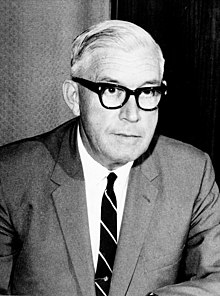Alan Hulme
Alan Shallcross Hulme , KBE (born February 14, 1907 in Mosman , Sydney , New South Wales , † October 9, 1989 in Nambour , Queensland ) was an Australian politician of the Liberal Party of Australia (LP) who was a member of the House of Representatives and Minister several times.
Life
Alan Shallcross Hulme, second child of British-born civil servant Thomas Shallcross Hulme and his wife Emily Clara Hynes, attended North Sydney Boys' High School and began his first career as an errand boy for Burns, Philp & Co. Ltd at the age of fifteen in 1922 . He later trained as an accountant and joined the law firm of Cullen-Ward & Co. at. In 1934 he moved to Queensland to open the local accounting office Cullen-Ward & Co. in Brisbane . In 1938 he received a scholarship from the Institute of Chartered Accountants in Australia. In 1943 he was a founding member of the Queensland People's Party and served as its president and campaign manager from 1946. However, he supported the merger with the Liberal Party of Australia LP ( Liberal Party of Australia ) , which he considered as a national party better suited to dismantling war controls and promoting liberalism . A supporter of free enterprise, low taxes and lean governments, he ran for the Liberal Party in the 1949 general election and was first elected to the House of Representatives in Brisbane's Petrie constituency in Brisbane . Despite being a committed supporter of Prime Minister Robert Menzies was, he was initially sometimes called a "burr in the saddle bag" ( "burr in the saddlebag") of the coalition government viewed that had made his opinion too many concessions to the government regulation. He was a member of the House Committee between 1950 and 1958 and of the Joint Committee of Public Accounts from 1952 to 1958 . He was also in the Commonwealth of Nations between 1954 and 1955 chairman of the Committee on Rate of Depreciation and from 1956 to 1958 of the Immigration Planning Council .
On December 10, 1958, Hulme was appointed Minister for Supply in the Menzies VII government. In the elections of December 9, 1961, which brought a stalemate between the coalition government made up of the Liberal Party and Country Party and the opposition Australian Labor Party (ALP), he lost his seat in the House of Representatives to his ALP challenger Reginald O'Brien and therefore on December 22, 1961 also his ministerial post. After leaving Parliament, he served as a management consultant and director of Chandlers Australia Ltd and JB Chandler Investment Co. Ltd. active.
In the elections of November 30, 1963, Alan Hulme won against Reginald O'Brien back the Petrie constituency and was again a member of the House of Representatives. In the then formed on December 18, 1963 government Menzies VIII he was appointed Postmaster General . In an increasingly turbulent time, he was responsible for the Australian Broadcasting Commission (ABC). Believing that there was bias and imbalance in ABC news and commentary, he was frequently confronted with some reporters he viewed as leftist propagandists and commissioners he deemed ineffective. In a letter to the chairman of the commission commenting on ABC's 1970–71 budget estimates, he suggested cutting television programming for current affairs such as Four Corners and This Day Tonight . ABC staff forwarded the letter to the newspapers and in the ensuing excitement about ABC independence, Hulme withdrew his proposal but remained unrepentant. He held the post of General Postmaster for almost nine years until December 5, 1972 in the governments of Holt I , Holt II , McEwen , Gorton I , Gorton II , Gorton III and McMahon . During his tenure as Postmaster General, he also announced the introduction of VHF radio , color television , international telephone calls via the AUSSAT Pty Limited satellite and the inclusion of health warnings in tobacco advertising. The controversial Black Mountain Tower in Canberra, completed on May 15, 1980, is still a memorial to his record time as postmaster general. He was also Vice-President of the Executive Council from January 26, 1966 to December 5, 1972 and was considered a tough negotiator who had coined the motto: "Nothing is agreed until everything is agreed." ( "Nothing is agreed until everything is agreed." ).
On January 1, 1971, Alan Shallcross Hulme was beaten Knight Commander of the Order of the British Empire and since then has had the suffix "Sir". On May 3, 1938, he married Jean Frances Archibald in the Methodist Church in the West End. From this marriage there were two sons and one daughter.
Web links
- Parliamentary Handbook for the 45th Parliament. (PDF; 13.4 MB) Parliament of Australia, accessed on September 29, 2019 .
- Peter Coleman: Hulme, Sir Alan Shallcross (1907–1989) in Australian Dictionary of Biography (online version)
- Entry in Prabook
Individual evidence
- ↑ Knights and Dames in Leigh Rayment's Peerage Page
| personal data | |
|---|---|
| SURNAME | Hulme, Alan |
| ALTERNATIVE NAMES | Hulme, Alan Shallcross (full name) |
| BRIEF DESCRIPTION | Australian politician |
| DATE OF BIRTH | February 14, 1907 |
| PLACE OF BIRTH | Mosman , Sydney , New South Wales |
| DATE OF DEATH | October 9, 1989 |
| Place of death | Nambour , Queensland |
